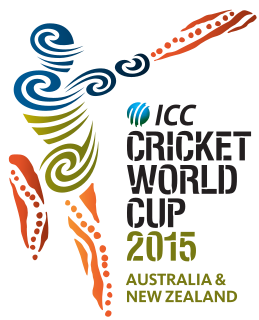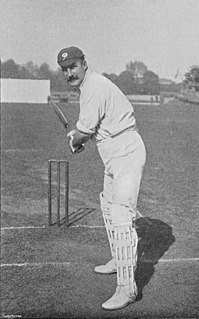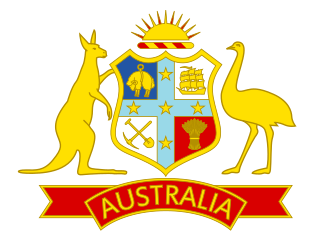The 1975 Cricket World Cup was the first edition of the Cricket World Cup, organised by the International Cricket Conference (ICC) and was the first major limited overs One Day International (ODI) cricket tournament to be held. It was held from 7 to 21 June 1975 in England.

New Zealand Cricket, formerly the New Zealand Cricket Council, is the governing body for professional cricket in New Zealand. Cricket is the most popular and highest profile summer sport in New Zealand.

Eden Park is New Zealand's largest sports stadium. Located in central Auckland, New Zealand's largest city, it is three kilometres southwest of the CBD, on the boundary between the suburbs of Mount Eden and Kingsland. Although used primarily for rugby union in winter and cricket in summer, it has hosted rugby league and football matches. In 2011 it hosted pool games, two quarter-finals, both semi-finals and the final of 2011 Rugby World Cup. In doing so it became the first stadium in the world to host two Rugby World Cup Finals, having held the inaugural final in 1987. It was a venue for the 2015 Cricket World Cup, which was jointly hosted by Australia and New Zealand.

The New Zealand women's national cricket team, nicknamed the White Ferns, represents New Zealand in international women's cricket. One of eight teams competing in the ICC Women's Championship, the team is organised by New Zealand Cricket, a full member of the International Cricket Council (ICC).

Luteru Ross Poutoa Lote Taylor is a New Zealand cricketer, who plays predominantly at number four in all formats of the game. Taylor is considered as one of the greatest batsmen to represent New Zealand and became the nation's highest ODI century maker surpassing Nathan Astle, on 22 February 2017, with his 17th ODI century.

The 2015 Cricket World Cup was the 11th Cricket World Cup, jointly hosted by Australia and New Zealand from 14 February to 29 March 2015. Australia defeated New Zealand by 7 wickets to win their fifth ICC Cricket World Cup. Fourteen teams played 49 matches in 14 venues, with Australia staging 26 games at grounds in Adelaide, Brisbane, Canberra, Hobart, Melbourne, Perth and Sydney while New Zealand hosted 23 games in Auckland, Christchurch, Dunedin, Hamilton, Napier, Nelson and Wellington.
The England cricket team toured Australia in the 1990–91 season to play a five-match Test series against Australia for the 1990–91 Ashes series. Whilst on tour, the English team played ten other first-class matches and participated in the three-way World Series Cup against Australia and New Zealand.

The 1876–77 tour of Australia and New Zealand was at the time considered to be another professional first-class cricket tour of the colonies, as similar tours had occurred previously, but retrospectively it became classified as the first Test cricket tour of Australia by the English cricket team. The English team is sometimes referred to as James Lillywhite's XI. In all, they played 23 matches but only three including the two Tests are recognised as first-class. The first match started at the Adelaide Oval on 16 November 1876 and the last at the same venue on 14 April 1877. There were fifteen matches in Australia and, between January and March, eight in New Zealand.
The India national cricket team toured Australia in the 1980–81 season to play 3 Test matches. The series was drawn 1-1.
The West Indies cricket team toured New Zealand and Australia from November 1930 to March 1931 and played a five-match Test series against the Australia national cricket team. Australia won the series 4–1. Australia were captained by Bill Woodfull and the West Indies by Jackie Grant. In addition, the West Indians played nine first-class matches against Australian state teams and, in November, one match in New Zealand against Wellington.
The final of the 2015 Cricket World Cup took place on 29 March 2015 at the Melbourne Cricket Ground in Melbourne, Australia. It was played between the tournament's two co-hosts, New Zealand and Australia. Australia went into the game as favourites and won by 7 wickets for a fifth World Cup triumph. The match was played in front of 93,013 spectators, a record crowd for a day of cricket in Australia.
The Australia national cricket team toured New Zealand from February to March 1993 and played a three-match Test series against the New Zealand national cricket team. The Test series was drawn 1–1. New Zealand were captained by Martin Crowe and Australia by Allan Border. In addition, the teams played a five-match series of Limited Overs Internationals (LOI) which Australia won 3–2.

Lord Hawke selected a cricket team of ten amateurs and two professional players to tour Australia and New Zealand from November 1902 until March 1903. After an opening game in San Francisco, the tour began of eighteen matches - seven of them considered first-class - in New Zealand followed by three further first-class games in Australia. Hawke's team was the first to tour Australasia with New Zealand as the primary destination and, as was the norm at the time, was privately run and funded. The Australian leg of the tour was a "profit making venture", however the games in New Zealand were scheduled at the behest of the New Zealand Cricket Board in order to raise the profile of cricket in the country. Two of them were against a New Zealand cricket team, before its international Test status. The inclusion of such games on the tour were considered "a sign that cricket in New Zealand was starting to be taken more seriously, and a move towards official international status was possible."
The Australia national cricket team toured New Zealand from February to April 2000 and played a three-match Test series against the New Zealand national cricket team. Australia won the Test series 3–0. New Zealand were captained by Stephen Fleming and Australia by Steve Waugh. In addition, the teams played a six-match series of Limited Overs Internationals (LOI) which Australia won 4–1.
The New Zealand national cricket team toured Ceylon and Australia in October and November 1937 to play four matches, of which the three Australian matches are rated first-class. The New Zealand team was captained by Curly Page. They played the Ceylonese national team in Colombo and then three Australian state teams.

The 2017–18 Trans-Tasman Tri-Series was a Twenty20 International (T20I) cricket tournament that was held in Australia and New Zealand in February 2018. It was a tri-nation series between Australia, England and New Zealand. It followed on from England's tour of Australia, which included the 2017–18 Ashes series, and took the place of the planned Chappell–Hadlee Trophy series. It was the first T20I tri-series contested by full ICC members.
The 1980–81 World Series was a One Day International (ODI) cricket tri-series where Australia played host to India and New Zealand. Australia and New Zealand reached the Finals, which Australia won 3–1.
The 1987–88 World Series was a One Day International (ODI) cricket tri-series where Australia played host to New Zealand and Sri Lanka. Australia and New Zealand reached the Finals, which Australia won 2–0.









